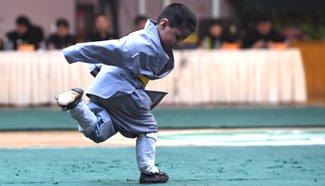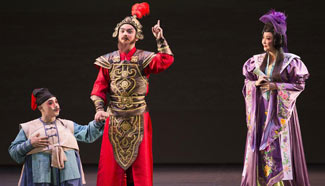by Xinhua Writer Wang Xue
AIN SOKHNA, Egypt, Oct. 18 (Xinhua) -- Getting up at eight o'clock in the morning, Nahla Emad walked to her office with a clear and active state of mind to start her work in a new day.
For Emad, 30, the experience of working in the China-Egypt Suez Economic and Trade Cooperation Zone (SETC Zone) for the past seven years has greatly changed her attitude toward the Chinese people as well as her own life.
"Now everything at work is like a habit and the company is like my home. I live here, work here and built up my family here," Emad told Xinhua.
Established in 2009, the SETC Zone, with an initial area of 1.34 square km, has so far attracted 65 companies and investment of more than 1 billion U.S. dollars while offering thousands of jobs for local people. Another expansion project of 6 square km is under construction.
Located at Ain Sokhna, a town near the Suez Canel and some 120 km east to the capital of Cairo, the area rises today as the "first Chinese city in Egypt."
It has become a landmark project of cooperation between China and Egypt under the Belt and Road Initiative proposed by Chinese President Xi Jinping in 2013.
As Emad said, the garden-like zone, operated by Egypt TEDA Investment Company, is like another home for nearly 250 Egyptian employees working on its development projects.
"I was young with no experience in this kind of job when I joined the TEDA team, but now I am a manager of the marketing department," Emad said, adding that she had never dreamed of such a promotion.
Proudly talking about her work, the young manager said she works from 9 a.m. till 5 p.m. every day, with one hour's lunch break, adding the company provides transportation for staff to go back home on weekends.
"My life in TEDA is stable and organized. I can feel my progress every single day," she said.
"I learned from the Chinese people's concentration on work, perfectionism and constant desire for self-development, which are valuable principles that I will always hold on to in the future," she said.
Regarding cooperation with her Chinese colleagues, Emad told Xinhua that "all the Chinese staff have developed a good understanding of Egyptian habits, traditions and customs, so they know how to deal with us and they always care about our feelings at work."
She continued saying that the company has set an example of the Chinese-Egyptian cultural interaction in a coherent environment where cultures and expertise are shared.
In the seven-story TEDA office building, everyone is busy at work in good order. A panel on the wall of every room shows in detail the workflow and related regulations at work.
In one of the nearby tidy, bright offices, Amira Reda, of the same age as Emad, was busy preparing some new work initiatives with her colleague.
"I have been working for TEDA since 2008 as an administration staff member, and now I am in charge of the company's operational management," Reda said.
"During eight years in TEDA, my personality changed from shyness and immaturity to confidence. I am so proud of myself," she told Xinhua with a smile.
Reda said that besides the healthy environment and cooperation between the Chinese and Egyptian sides, the company annually organizes training courses either in China or Egypt to help improve the efficiency and expertise of its staff.
"I went to China for a training course two years ago and it was really an unforgettable journey," said Reda, who looked so professional in her Egyptian-styled office outfit.
After several years of working with Chinese colleagues, Reda believes that the Chinese culture is based on respect, inclusiveness and prudence.
She said that her company is contributing to improving the living conditions of its Egyptian staff by providing them with necessary incentives such as housing units, transportation, among others.
"As a female worker in a male-dominant society, now I have my own apartment and my own car, and the young generation working here has good opportunities to achieve their ambitions," she said.
As for 20-year-old newcomer Ahmed Soliman, he seemed so active, ambitious and full of curiosity.
"I am new in TEDA but I feel energetic every day, with so much work at hand and so many things to learn," the young man told Xinhua.
"The Chinese people care so much about every single detail at work, which is very essential to reach excellence," he added.
Soliman said that working in a Chinese company helped him understand why China achieved its economic leap, referring to the Chinese people's commitment and seriousness at work.
"Everytime I look at my Egyptian seniors here, I realize this place provides a real chance for career development, which gives me hope for the future," he said.










